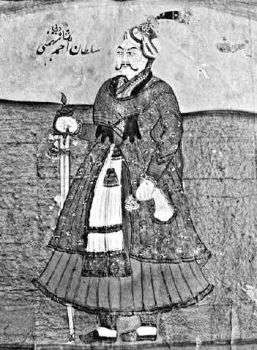Ahmad Shah I Wali



Ahmed Shah Al Wali Bahamani ruled the Kingdom of Bidar from 1422 to 1436 and was a great patron of arts and culture.[1] He brought artisans from Iran, including the metal-worker Abdulla-bin-Kaiser, who was the master of Bidriware, the inlaying of zinc alloy with silver and gold.[2]
Ahmed Shah's, and his empress's, tomb is located in Ashtur village, Bidar District,[1][3] and is the subject of an annual urs, or anniversary of death festival.[1][4]
The tomb of the Bahmani King Ahmed Shah Al Wali is a place of worship visited by Hindus and Muslims, and a centre of communal harmony.
Ahmed Shah fought battles against Vijayanagar[5] (1423), Warangal (1424–1425), Malwa (an ancient kingdom whose capital was situated in Ujjain) (1425–1435), and against Gujarat (1425–1435).
Notes
- 1 2 3 Staff (5 March 2007) "Symbol of communal harmony" The Hindu
- ↑ Nathanael, M. P. (20 January 2002) "The Sunday Tribune: Spectrum: Travel: Bewitched by Bidar" The Tribune, Chandigarh, India
- ↑ "Bidar:Tomb of Ahmad Shah Baihmani" Institute of Oriental Culture Japan
- ↑ Desai, Rishikesh Bahadur (18 April 2005) "A centre for communal harmony comes alive" The Hindu
- ↑ Sen, Sailendra (2013). A Textbook of Medieval Indian History. Primus Books. pp. 106–108. ISBN 978-9-38060-734-4.